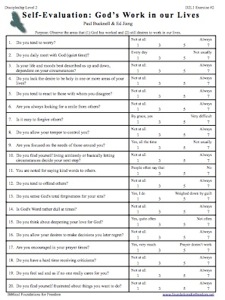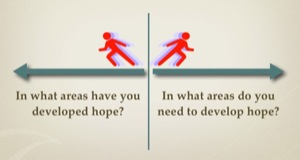

Discovering Choices: Lesson #2
Discipleship Level 2: Reaching Beyond Mediocrity
Paul J. Bucknell
Choices | Battlefield | Evaluation | Path of Life | 3 Choices
![]()
Purpose: Processing the Spiritual Growth Self-Evaluation Exercise Sheet, the third part of the second lesson Discipleship 2: Reaching Beyond Mediocrity series, helps analyze the personal growth self-evaluation sheet so that one can see a person's strong areas as well as areas that God is interested in developing.
Processing the Spiritual Growth Self-Evaluation Exercise Sheet
The spiritual growth self-evaluation exercise sheet helps a person understand how one is doing in this battle. It helps you detect areas of hope and hopelessness. Our objective is clear: make you hopeful, successful and equipped to help others to succeed in their spiritual lives. Let us better understand how to benefit from the self-evaluation sheet. {The evaluation and complete book and exercises are available in the book at the bottom.}
 General assessment
General assessment
Add up the numbers. With twenty questions and a possibility of 140 points (7 X 20). If your numbers are above 70 points, then pay attention to a general sense of hopelessness. There are possibly several areas that you are not excelling in. Do not be over concerned. They perhaps have a common problem and solution. Once these common problems are discovered, that discovery can help you move forward quickly.
If you scored below 70 points (the lower the better), you are generally doing well. You are doing some things right that help in the overall discipline of your lives.
Specific assessment
The next thing to do is go through your sheet and circle your three or four questions with the highest and lowest scores. We want to see areas in which God has been working in your lives (with scores 1-3) and areas that God still is seeking to do some special work (with scores 5-7).
Testimony focus
Those with a low score are the areas in which God has given you extra grace. These areas are the ones that God will begin to use you in to help others who are not doing well in those areas. You need to be aware that many people are not aware of the areas that they are strong in. We are trying to make you aware of these through this exercise.
The problem is, though, even if a person is aware of some strong areas of development in their own lives, they do not know how to help others.I agree this is a bit more difficult but not very hard with a little guidance. Discipleship Level 2 focuses not only in helping you grow but to help you grow others. As we go through different examples, different patterns will develop, and after a while you will notice them, quickly recognize them, discern them and voice them.
Growth focus
The questions in which you circled 5-7 are areas that mark out areas that God is interested in helping you to grow in. Even if we did well in most areas and came up with a general low score, It is possible that we fail miserably in one area. (That area might not even be mentioned on the evaluation sheet.) Weak spots in our lives often overlap and affect other areas but sometimes they are confined because of other restraints. The Lord wants to work in all these areas.
You might be thinking that you have tried hard to overcome some particular struggle, but it has a stranglehold on you. Every time you start responding to the Lord, this struggle pulls you down. As we go through this series, we hope to model the general way to overcome problems. Some areas that we discuss might be the same for us while others will be different.

Summary
One can use this evaluation sheet for oneself or for others to help people spot strong and weak points. One does not need to even pass out a sheet for them to fill in. The questions are meant to help you make observations of your own lives and others. We are not observing others to condemn them (we always need to be careful of this - Galatians 6:1) but making observations to encourage them. "Bear one another's burdens, and thus fulfill the law of Christ" (Galatians 6:2).
We are seeking how God might want us to help and encourage others. In a positive sense, you might go up to a brother and tell him how much his faithfulness in a certain area has been a help to you. Or God might put someone on your heart and you are prayerfully wondering how you can be of help to that person. The questions in the evaluation sheet can help you get started.
Just like a physician, we are taking an overview of the person, taking a general look into every area, but trying to identify the most sore spot. The acuteness of pain, or in our case, the greatest amount of hopelessness, is probably where we need to start working.
I recently spoke to one person who was feeling rather hopeless, but it is remarkable how he earlier shared with me how God had clearly spoken to him from several passages that day. I encouraged him pointing to the fact that though he might be discouraged in one or more areas, he certainly is doing well taking God's Word in.
The fact that he read God's Word at all, met God, heard from God and allowed God's Word to some degree guide his thoughts even in discouraging times, shows he was doing well. Remember the evil one will often try to discourage us but God is always there encouraging us to grow strong in our faith.
Looking for Hope
After such evaluations, you might feel it is quite impossible to move forward. I would like to assure you that we all need to continue to grow. Level 2 focuses on major corrections but Level 3 keeps refining one's life. As long as one feels defeated, that objective seems totally unreasonable.
Start to notice what thoughts linger in your mind when you think about your defeats or victories. But when you start to see the victories, then you get stronger and stronger. This hope and joy is the result of the new life that the Lord has given us in Christ. 
Even at this point, you might have the evil one turning your minds into a battlefield. Even though I try to reassure you, you are probably thinking of some hopeless cases either in yourself or others. You are wondering, "It is easy for him to say" or some other such critical thoughts.
Let me give you an unofficial assignment. Begin to note the phrases and words that regularly come to your mind. The battle is in the mind and unless we are able to pay attention to the thoughts in our minds driving our lives, we will not be able to make significant and long lasting changes in our lives.
If you are discouraged, see if any repeated words or phrases come to you mind. Start making a list. You will learn that it is through such mental manipulations that the evil one dominates a person's minds. We are more aware of the sights through which Satan ensnares us such as sensual pictures. Even here, however, we need to catch what our minds are thinking that makes that attractive rather than repugnant.
In Christian terminology, these words are called temptation. If we are unaware of his involvement in our thoughts, then surely he can easily get us down. We will later discuss how to bypass these thoughts with the Word of God, but first just take joy that you do not have to listen to the evil one! You have overcome the evil one! (The evil one himself is not referred to here but his many demons who assist him in this task of confusing minds and making people feel helpless.).
-> Continue on reading part 4/6: Understanding Spiritual Growth
Reaching Beyond Mediocrity (Click here)
Discipleship at the 2nd level
by Paul J. Bucknell
God's Word comes alive as you learn how to use it to overcome personal struggles like anxiety, depression, pride, lust and anger. God has made you strong! Many worksheets! (300+ pages). This is the full resource with all the complete and updated pages included!
info@foundationsforfreedom.net
Scriptures typically quoted from the New American Standard Bible unless noted:
(C) Copyright The Lockman Foundation 1988










